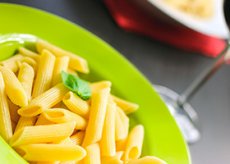New publications
Are pasta and diet compatible?
Last reviewed: 02.07.2025

All iLive content is medically reviewed or fact checked to ensure as much factual accuracy as possible.
We have strict sourcing guidelines and only link to reputable media sites, academic research institutions and, whenever possible, medically peer reviewed studies. Note that the numbers in parentheses ([1], [2], etc.) are clickable links to these studies.
If you feel that any of our content is inaccurate, out-of-date, or otherwise questionable, please select it and press Ctrl + Enter.

The low glycemic index allows you to eat pasta sometimes, including for those who watch their figure.
For those who are on a diet, carbohydrates are the main taboo, but not all of them can cause harm.
For example, let's consider the well-known and beloved pasta - macaroni, noodles, spaghetti, etc. Products made from wheat rich in gluten (the so-called hard varieties) have a low glycemic index. This means that after eating them, the blood glucose level will increase gradually and will not reach high numbers.
If you have to choose between confectionery and pasta, it is better to give preference to the latter: carbohydrates from them are not absorbed immediately, but gradually enter the bloodstream, so they do not create a burden for the pancreas. As a result, the immune system does not strain, the metabolism does not suffer, since there is no need to direct all forces to utilize a large amount of sugar. Many nutritionists consider carbohydrates from pasta made from durum wheat relatively safe.
Why did the word "relatively" appear? Indeed, vermicelli and noodles do not pose a danger to the metabolic processes occurring inside the body, so they should not provoke the appearance of excess weight. In order to verify this, doctors representing St. Michael's Hospital and the University of Toronto studied thirty scientific papers on dietary nutrition. These works described careful observation of patients who followed a diet that included the use of products with a low glycemic index.
The study included information on two and a half thousand patients. They all adjusted their diets, replacing so-called fast carbohydrates with pasta. The average amount of pasta consumed per week per person was almost three and a half servings. The average serving was about half a 250 ml cup. What did the researchers ultimately find?
Based on the results of a combined analysis of the nutritionists' work, specialists confirmed that pasta and other types of pasta do not lead to excess weight gain. Even more: patients who included pasta in their diet lost at least 500 g over three months. Of course, it is necessary to take into account that people ate not only noodles, and everyone's diet menu was different. And the researchers kept silent about the subjects' physical activity.
Now let's get back to why pasta can be considered "relatively" safe. The fact is that these products themselves will not cause harm if they are added to the diet in reasonable quantities. It is good if spaghetti is seasoned with vegetables stewed in a small amount of water, a small amount of hard cheese. However, fatty sauces prepared on the basis of cream and oils can increase the caloric content of a portion several times. This point must be taken into account when compiling a diet menu.
You can read more about the study on the pages of BMJ Open (https://bmjopen.bmj.com/content/8/3/e019438).

 [
[